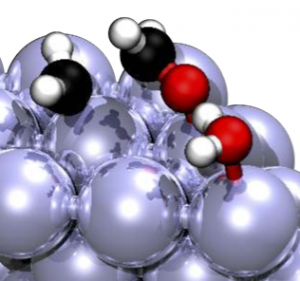I am looking for a motivated master/PhD student (starting in February 2025 /spetember 2025) to investigate the glucose/fructose isomerization catalyzed by a base. This project is in the context of the ANR project Bisoglu in collaboration with C. Pinel and A. Mesbah from IRCE Lyon and I. Delidovich fom TU Wien, Austria.
More information here
 Welcome!
Welcome! Improving the current understanding of reaction mechanisms is my main motivation. My interests are spanning a wide range of chemical systems, with a preference for complex reactions occurring at a solid/liquid interface and Green Chemistry: biomass valorisation, preparation and degradation of heterogeneous catalysts, non-conventional activation in catalysis, etc.
Improving the current understanding of reaction mechanisms is my main motivation. My interests are spanning a wide range of chemical systems, with a preference for complex reactions occurring at a solid/liquid interface and Green Chemistry: biomass valorisation, preparation and degradation of heterogeneous catalysts, non-conventional activation in catalysis, etc. To do so, I rely mainly on DFT and on the computation of the reaction profiles (stability of intermediates and transition states) and on continuum and micro-solvation models of the water solvent. To reach a full description of the liquid water, molecular mechanics and rare events methods (metadynamics) are currently my favorite tools.
To do so, I rely mainly on DFT and on the computation of the reaction profiles (stability of intermediates and transition states) and on continuum and micro-solvation models of the water solvent. To reach a full description of the liquid water, molecular mechanics and rare events methods (metadynamics) are currently my favorite tools.